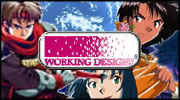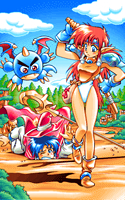Few companies produced games for the Sega CD on the level of quality Working Designs did. Although they only released four titles, all are mandatory purchases for Sega CD owners. To celebrate these amazing games, Sega-16 has devoted an entire week to them, and we conclude our tribute to WD with an intact reprinting of the interview with Victor Ireland that originally appeared in the Sandwich Islands Publishing strategy guides for Lunar: The Silver Star & Popful Mail. The interview was conducted in 1993 and 1995.
An Interview with Victor Ireland
One thing you quickly find out about the video game industry is that very few of the movers, shakers, wheelers, and dealers actually play video games. Victor Ireland is a welcome exception. He’s a game player who knows what other game players want and he listens to them by importing the best games the Japanese market has to offer.
 Ireland’s company, Working Designs, was one of the very few third-party companies to support the NEC TurboGrafx-16 (and the TTI Duo) and quickly built a loyal following of gamers with their brilliant translations of popular Japanese games: Cadash, Cosmic Fantasy 2, Exile, and Vasteel. Working Designs headed into the Sega CD market with Lunar: The Silver Star, which is one of the most successful Sega CD games to date. They followed up with the sleeper Vay, which got a bit lost in the by-then-overcrowded Sega CD market. The fans said they wanted Popful Mail, so Ireland brought it over too.
Ireland’s company, Working Designs, was one of the very few third-party companies to support the NEC TurboGrafx-16 (and the TTI Duo) and quickly built a loyal following of gamers with their brilliant translations of popular Japanese games: Cadash, Cosmic Fantasy 2, Exile, and Vasteel. Working Designs headed into the Sega CD market with Lunar: The Silver Star, which is one of the most successful Sega CD games to date. They followed up with the sleeper Vay, which got a bit lost in the by-then-overcrowded Sega CD market. The fans said they wanted Popful Mail, so Ireland brought it over too.
The first half of this interview was conducted in November 1993, when we called up Ireland and talked with him about as many topics as we could squeeze into an hour-long phone call (this first half of the interview was originally published in Lunar: The Official Strategy Guide). In March 1995, we went high-tech and emailed Ireland a group of new questions to update the interview, asking about Popful Mail and the future plans of Working Designs.
Zach Meston: How long have you been playing video games?
Victor Ireland: Since I was old enough to move a joystick. Pong came out when I was just big enough to get my head over the bottom of the console. Video games came out just as I was old enough to catch up with them and I’ve been riding them ever since.
Zach Meston: Do you think of yourself as a good game player?
Victor Ireland: I’m not as good as I used to be. I think age is taking its toll. When Defender came out, I could roll it over (score so many points that the counter “rolled over” to zero). I went and played it recently and I totally sucked.
Zach Meston: What are your favorite video games of all time?
Victor Ireland: Defender is right up there. Asteroids was really popular but I never got into it. Mappy was good. I liked Xevious a lot. I loved Crazy Climber. There’s a version of that for the Atari 2600 you can get somewhere. The programmer did an illegal function call that jumped into an interrupt it wasn’t supposed to, so the game wouldn’t work on about 20% of the 2600s on the market. The programmer got mad at whoever he was working for, so he took the programming code and left the company. Atari had the compiled code but no way to decompile it, so they couldn’t fix the problem. They ended up producing the carts and dumping them. They lost a ton of money.
Zach Meston: How did you get involved with Working Designs?
Victor Ireland: Working Designs was originally formed to create computer accounting software for the transportation industry. Then the programmer doing the software died. I knew the programmer and I was around, so I got recommended for the job. They hired me and I finished up the software, which took a few years.
By 1989, things were running smoothly. I was writing for VideoGames & Computer Entertainment (now known as VideoGames), I had lots of Japanese connections and thought “wouldn’t it be nice to bring out great PC-Engine games?” I talked to Sylvia (Schmitt, president of Working Designs) and formed a partnership. The transportation software was running itself by now, so we left it behind and went into game software.
The following text is the email half of the interview, made possible through the miracle of the CompuServe network.
J. Douglas Arnold: Can you give us any insight into what the name Popful Mail means? Is there any other translation you’ve heard?

Victor Ireland: We were told that it was simply the name the original design team came up with for the main character. Since it’s phonetic, it could also be rendered “Popple Mail,” but we like the way “Popful” looked as opposed to “Popple,” so that’s what we ran with. Because of the way the main character is drawn, we joked during the recording sessions that her name was what it was because her mail (armor) was “popping full.” But it was a joke. Heh heh.
J. Douglas Arnold: When was Popful Mail originally released in Japan and how did it do?
Victor Ireland: Popful Mail was originally released around May of 1994. It did very well, especially considering the deadness of the Mega CD market in Japan. It hit the top tens lists for several months in a row. Since it’s a game programmed by Falcom originally, of course it has a bigger profile than just any action/RPG. That’s one of the reasons we wanted it. We’re big fans of Falcom.
J. Douglas Arnold: Popful Mail seems to have more voices than in it than other Working Designs games. How long did it take to record all of those voices?
Victor Ireland: The game has 39 speaking parts, although a few are just one- or two-liners. Recording started in August 1994 and finished about the first week of December, although most of December was spent on miscellaneous things that were overlooked or or fixups to clarify certain scenes. So, we were recording for four months, twice as long as any other project we’ve done. We had two directors going, too (myself and Dean Williams). for a while there, we were going 12 to 16 hours a day between two shifts. All that for 2.5 hours of in-game dialogue and 20 minutes of anime!
Part of the reason it takes so long is that I’m a perfectionist. We may do 20, 30, 40, or more takes of a single line. Sometimes, we took over 50 just to get the right feeling. Quite a bit of the humor evolved in the studio, so we’d play a scene in a certain way and record it, then decide it could be better if we tweaked this or that. It’s the tweaking that eats the time but the result was worth the effort.
J. Douglas Arnold: How close is the story in Popful Mail to the Japanese version? Was any of it lost in the translation?
Victor Ireland: The Japanese version was pretty dull, dialogue-wise. The basic story elements in our version are the same but some of the plot points are fixed up (the Japanese version had logic holes with the Kazyr/Orbs/Mumbles scenario). And, the dialogue is substantially funnier in our version. Because of the light tone of the game, we went all-out on humor. We’ll have to reign ourselves back in a bit for Lunar: Eternal Blue.
J. Douglas Arnold: How many more games will Working Designs be making for the Sega CD?

Victor Ireland: Lunar: Eternal Blue is our last scheduled product for the Sega CD, so I guess the answer is one. But talk about going out with a bang! Oh baby, this game is h-o-t HOT! It’s really going to blow some people away!
J. Douglas Arnold: Does Working Designs plan on porting any of their Sega CD titles to other CD systems?
Victor Ireland: All of our conversions pretty much stay on the system they were originally programmed on. We’re not looking to port any of our stuff to say, 3DO.
J. Douglas Arnold: Which next generation system do you see becoming the next big gaming platform?
Victor Ireland: That’s a tough question. I think it’ll definitely be between Sega and Sony. We’re going to try to support both of them with great RPGs. Because Nintendo is sticking to carts, they’re out of the running, especially if they’re CD-less at $250 and Sony comes in at the rumored $299 with a CD drive. It’ll be fun to see what happens and know that we’ll be playing the latest Japanese games looking for hot stuff to port over!
Don’t forget to read our full reviews of Lunar:The Silver Star and Popful Mail.

Recent Comments